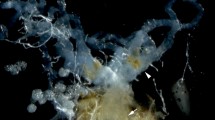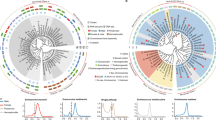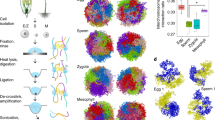Abstract
THE chromosome system of the mealy bug, Planococcus citri (= Pseudococcus), is unique for the study of differences between heterochromatin and euchromatin. In the male, the paternal chromosomes are heterochromatic; that is, they remain condensed throughout interphase. In the female, both maternal and paternal sets are euchromatic. The paternal set behaves like heterochromatic sex chromosomes of other organisms; it reproduces asynchronously from the maternal or euchromatic set and is genetically inert1. Marker genes in the mealy bug are expressed in the male only if received from the mother (personal communication from S. W. Brown). X-ray damage to the heterochromatic set is not expressed2 and the heterochromatic set is not labelled with tritiated uridine3.
This is a preview of subscription content, access via your institution
Access options
Subscribe to this journal
Receive 51 print issues and online access
$199.00 per year
only $3.90 per issue
Buy this article
- Purchase on Springer Link
- Instant access to full article PDF
Prices may be subject to local taxes which are calculated during checkout
Similar content being viewed by others
References
Brown, S. W., and Nur, U., Science, 145, 130 (1964).
Brown, S. W., and Nelson-Rees, W. A., Genetics, 46, 983 (1961).
Berlowitz, L., Proc. US Nat. Acad. Sci., 53, 68 (1965).
Loewus, M. W., Brown, S. W., and McLaren, A. D., Nature, 203, 194 (1964).
Littau, V. C., Allfrey, V. G., Frenster, J. H., and Mirsky, A. E., Proc. US Nat. Acad. Sci., 52, 93 (1964).
Bonner, J., and Huang, R. C., J. Mol. Biol., 6, 169 (1963).
Barr, G. D., and Butler, J. A. V., Nature, 199, 1170 (1963).
Berlowitz, L., Proc. US Nat. Acad. Sci., 54, 476 (1965).
Johns, E. W., and Butler, J. A. V., Biochem. J., 87, 200 (1963).
Burton, K., Biochem. J., 62, 315 (1956).
Nakomoto, T., Fox, C. F., and Weiss, S. B. J., Biol. Chem., 239, 167 (1964).
Marmur, J., J. Mol. Biol., 3, 308 (1961).
Marushige, K., and Bonner, J., J. Mol. Biol., 15, 160 (1966).
Liau, S., and Lin, A. H., Proc. US Nat. Acad. Sci., 57, 379 (1966).
Mukherjee, A. S., and Beermann, W., Nature, 207, 785 (1965).
Nur, U., Genetics, 56, 375 (1967).
Hotta, Y., and Stern, H., Nature, 210, 1043 (1966).
Brown, S. W., Science, 151, 417 (1966).
Author information
Authors and Affiliations
Rights and permissions
About this article
Cite this article
LOEWUS, M. Analysis of Chromatin in Male and Female Mealy Bugs. Nature 218, 474–476 (1968). https://doi.org/10.1038/218474a0
Received:
Revised:
Published:
Issue Date:
DOI: https://doi.org/10.1038/218474a0
Comments
By submitting a comment you agree to abide by our Terms and Community Guidelines. If you find something abusive or that does not comply with our terms or guidelines please flag it as inappropriate.



